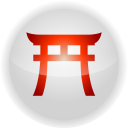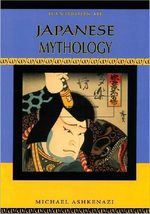Japanese Mythos
-
Japanese Mythos
-
| Amaterasu Omikami | - | Susanowo | - | Tsukiyomi |
| Ama-Tsu-Mara | Daikoku | Ebisu | Hachiman | Kishijoten |
| Oh-Kuni-Nushi | - | - | - | Raiden |
| Raiko | - | Yamamoto Date | - | Yoshi-Iye |
| Oriental Adventures | - | DDG | - | AD&&D |
| The Ninja | - | - | - | - |
The beings of this mythos present "ideal
types" who give their worshipers models to live && grow by.
As with one or two other mythoi,
this allows the true believer to become
as one of the gods with enough faith and natural ability (see DIVINE
ASCENSION).
The 1st religion of Japan was Shintoism,
and this faith centers around a deep love
&& affection for nature.
Temples: Temples
are arranged around trees and gardens.
All temples have male and female clerics.
There are also 8 million "Kami",
or divine spirits,
but none of these have images in the temples
(see below).
Shrines usu. face the south and sometimes
the east,
but never the north || west as they are
regarded as unlucky directions.
There is always a gateway (Torii)
to every shrine and

sometimes there are whole clusters of these
before the shrine.
Holy
symbols: Holy symbols do not
abound in this religion,
but there are 3 universal ones:
*the mirror (associated
with Amaterasu Omikami),
**the sword, <what
kind?>
***and a cluster of
perfect gemstones.
Transgressions:
Punishment for transgressions of any type is often through the stripping
away of personal ability.
A cleric who transgresses against the gods
may lose points from abilities (like strength
|| dexterity) for slight sins and spell
ability for greater sins,
always with the provision that these things
can be earned back with greater service.
Kami: The concept
of "Kami" is one that prevails in all of Japanese thought thoughout the
several faiths of of the island.
It is sometimes translated to "divinity"
or "spirit",
but is a much more universal idea that
is usu. left untranslated by those that understand it.
All things deserve to be revered and/or
dreaded for their own sakes.
The concept is applied to everything:
all animals,
all plants,
seas,
mountains,
or any natural phenomena.
Each of these has its own divine spirit
--
the larger (or more important) the place,
the greater the Kami.
If their "place" is threatened,
the Kami may actually materialize as a
person with druid || illusionist
abilities. <shukenja || wu jen abilities?>
see Nature Spirits +
| Warriors | Hachiman |
| LG | Amaterasu Omikami, Ebisu |
| LN | - |
| LE | - |
| NG | Tsukiyomi |
| N | Ama-Tsu-Mara, Raiden |
| NE | - |
| CG (Heroes) | Oh-Kuni-Nushi, Susanowo |
| CN | Susanowo |
| CE | Susanowo |
| Any being wishing luck | Kishijoten |
| Those wishing luck and riches | Daikoku |
Izanagi && Izanami (deities of creation)
Inari (god of rice)
Ho Masubi (god of fire)
Nai No Kami (god of earthquakes)
O-Wata-Tsu-Mi (god of ocean creatures, tides)
Kura Okami (god of rain and snow)
Shina-Tsu-Hiko (god of winds)
Amatsu-Mikaboshi (god of evil)
<
Primary Sources:
1. Kojiki
2. Nihon
Shoki
>
<

>